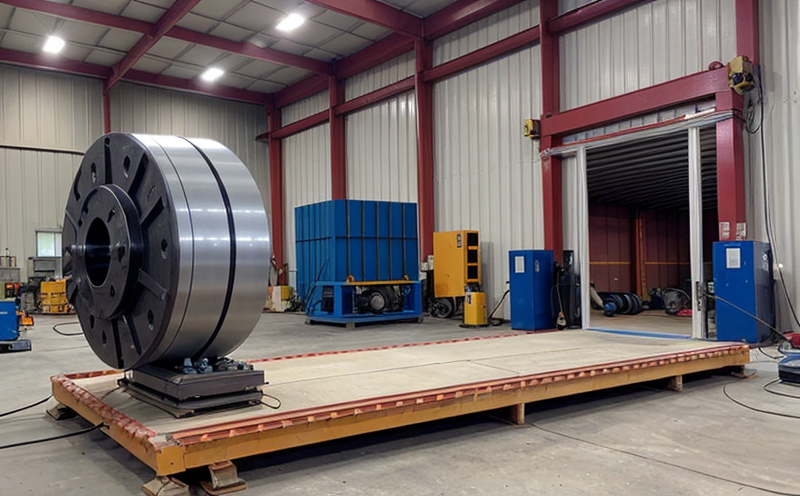EN 61373-3 Vibration Testing of Railway Components
The European Standard EN 61373-3 specifies the procedure for vibration testing railway components to ensure their durability and reliability under dynamic loading conditions. This test is critical in validating that rail vehicles, such as wagons, locomotives, and rolling stock, can withstand the harsh vibrations encountered during operation.
Understanding the context of railway infrastructure is essential when discussing this standard. Railways are designed to handle significant loads and environmental stresses over long periods. Ensuring that all components meet stringent vibration testing criteria helps guarantee the safety and longevity of these systems. This service plays a pivotal role in meeting regulatory requirements and enhancing overall product quality.
The test procedure outlined in EN 61373-3 involves subjecting specimens to controlled frequency and amplitude vibrations, simulating real-world operating conditions. The primary goal is to assess the structural integrity and performance of components under such stressors. This ensures that they do not fail prematurely or compromise safety during use.
The standard covers various aspects including specimen preparation, testing setup, environmental considerations, and data analysis. It emphasizes the importance of accurate instrumentation and precise control over test parameters like frequency range, amplitude, duration, and cycling rate.
Before testing begins, specimens must be prepared according to specified guidelines within the standard. This includes cleaning, marking, and possibly attaching sensors for monitoring during the test. The setup involves placing the specimen in a vibration machine capable of generating controlled vibrations that mimic actual railway operating conditions.
The testing process itself is rigorous and involves multiple stages. Initial tests determine baseline performance before exposure to simulated operational stresses. Following this, specimens are subjected to progressively more severe vibration levels, closely monitoring for any signs of failure or degradation.
After each stage of the test, detailed data analysis takes place using advanced software tools provided by our laboratory. This includes measuring displacement, acceleration, and other relevant parameters. Our team then interprets these results against predefined acceptance criteria to determine compliance with EN 61373-3 requirements.
The final report provides comprehensive insights into the tested components' performance throughout the entire testing cycle. It highlights areas of concern or improvement needed for future designs while also certifying adherence to industry standards like EN 61373-3.
- Thorough specimen preparation
- State-of-the-art vibration testing equipment
- Expertise in interpreting complex data outputs
- Precision in controlling test parameters
Applied Standards
The EN 61373-3 standard is widely recognized for its comprehensive approach to vibration testing of railway components. It aligns closely with other international standards such as ISO 10854 and ASTM E936, which also focus on dynamic load testing but may have slightly different parameters depending on specific application needs.
The European Union's commitment to safety and quality in rail transport means that compliance with EN 61373-3 is often a prerequisite for market entry. Many countries across Europe require manufacturers to undergo this certification process before selling products within their jurisdictions. This ensures consistent high standards of product reliability, which is crucial given the critical nature of railway systems.
For those responsible for quality assurance or compliance management in the building and infrastructure sector, ensuring adherence to EN 61373-3 can provide peace of mind that your organization meets stringent industry expectations. By leveraging this standard's robust framework, you help protect both personnel safety and infrastructure integrity.
Why Choose This Test
- Ensures compliance with European regulations: Compliance with EN 61373-3 is mandatory for many products used in railway applications. By offering this service, we help manufacturers meet regulatory requirements.
- Promotes product longevity and safety: Proving that your components can withstand the rigors of real-world conditions increases confidence among end-users regarding product reliability.
- Improves brand reputation: Demonstrating a commitment to quality through rigorous testing enhances consumer trust in your brand. This is especially important for companies operating internationally where adherence to local standards is key.
- Saves time and costs associated with rework or recalls: Identifying issues early on through thorough vibration testing reduces the likelihood of costly mistakes further down the line.
- Facilitates smoother supply chain integration: Meeting specific testing criteria allows seamless integration into larger systems, reducing potential disruptions during assembly processes.
- Supports innovation and development efforts: Continuous improvement is vital in any competitive market. Our vibration testing service provides valuable feedback to R&D teams, helping them refine designs for better performance and durability.
Customer Impact and Satisfaction
By choosing our EN 61373-3 vibration testing service, customers can expect a range of benefits that directly impact their business operations:
- Enhanced product quality: Rigorous testing ensures that only the highest quality components pass muster, leading to satisfied customers and repeat business.
- Increased market competitiveness: Compliance with European standards can give your products a competitive edge in both domestic and international markets.
- Reduced risks associated with non-compliance: Avoiding potential fines, penalties, or recalls due to non-conformance is crucial for any business operating within regulated industries.
- Improved customer trust: Showing that you adhere to strict testing protocols builds trust and loyalty among your clients.
We pride ourselves on delivering exceptional service tailored specifically to meet the needs of our customers. Our experienced team works closely with each client throughout the entire process, ensuring a smooth experience from initial consultation through final report delivery.





